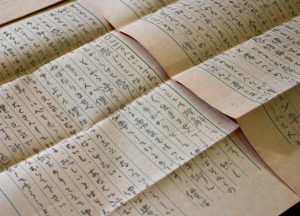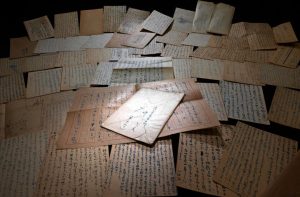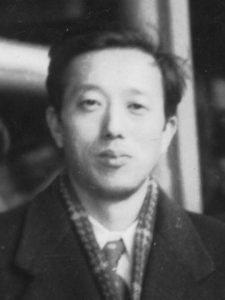Poet Sankichi Toge’s 50 handwritten correspondences from later years found in Hiroshima, reveal lifelong passion for poetry: “Overcoming the many crises, we shall move forward”
Aug. 4, 2022
by Miho Kuwajima, Staff Writer
About 50 correspondences handwritten by A-bomb poet Sankichi Toge (1917–1953) have been discovered in Hiroshima City. The writings include sealed letters and postcards that Mr. Toge wrote late in his life, at the time of publication of Poems of the Atomic Bomb, his representative work. The letters give a sense of a time shortly before his death in which he devoted himself to writing poems while resisting the Allied forces’ control over the freedom of speech during the occupation period. One expert commented that, “The letters are valuable materials that help us understand Mr. Toge’s attitude toward, and passion for, literature.”
Mr. Toge’s correspondences, dated from May 14, 1951, to March 2, 1953, about one week before his death at the age of 36, are addressed to a woman fellow poet who was staying in a national care facility in Hiroshima Prefecture. During the same period, in September 1951, he published Poems of the Atomic Bomb, which is known for beginning with the line “Give back my father, Give back my mother.”
The correspondences are jammed with scribbled handwriting on letter paper and postcards. One of the sealed letters, dated October 25, 1951, reads, “Overcoming the many crises, we shall move forward. I am determined to make that happen even if alone.” The optimistic words demonstrate Mr. Toge’s determination to fight against a myriad of burdens. On a postcard dated December 8, 1951, he expressed his pleasure about good sales of his poetry. “’Poems of the Atomic Bomb’ has been favorably accepted. I receive orders almost every day,” he wrote as he described his hectic situation, with meetings one after the other, such as joint review sessions with his literary friends and gatherings of people in the theater. Around that time, repeatedly coughing up blood, Mr. Toge had nearly reached his physical limits.
Before he experienced the atomic bombing at home in the area of Midori-machi, about three kilometers from the hypocenter in Hiroshima, Mr. Toge was engaged in the writing of romantic poems. After being faced with the unimaginable reality of the atomic bombing, he criticized himself in one of the letters found recently. “I am a naïve man. As long as I maintain this naiveté, I cannot possibly write good poetry,” wrote Mr. Toge.
The correspondences were discovered among materials archived at the offices of the Association for Preservation of Literary Materials of Hiroshima, located in the city’s Naka Ward. According to Masahiko Ikeda, 75, the association’s secretary general, the late Fujihiko Komura, former representative of the association and professor emeritus at Hiroshima University, held on to the correspondences he had received around 1990 from the family of the woman to whom Mr. Toge had originally written.
Fumito Iwasaki, 78, professor emeritus at Hiroshima University and an expert of modern and contemporary literature who verified his handwriting, said, “These are valuable correspondences that represent Mr. Toge’s views of literature and life as he worked to transcend the limits of self and attempted to work in concert with others. They must be carefully archived at a public institution and studied over time.”
(Originally published on August 4, 2022)
About 50 correspondences handwritten by A-bomb poet Sankichi Toge (1917–1953) have been discovered in Hiroshima City. The writings include sealed letters and postcards that Mr. Toge wrote late in his life, at the time of publication of Poems of the Atomic Bomb, his representative work. The letters give a sense of a time shortly before his death in which he devoted himself to writing poems while resisting the Allied forces’ control over the freedom of speech during the occupation period. One expert commented that, “The letters are valuable materials that help us understand Mr. Toge’s attitude toward, and passion for, literature.”
Mr. Toge’s correspondences, dated from May 14, 1951, to March 2, 1953, about one week before his death at the age of 36, are addressed to a woman fellow poet who was staying in a national care facility in Hiroshima Prefecture. During the same period, in September 1951, he published Poems of the Atomic Bomb, which is known for beginning with the line “Give back my father, Give back my mother.”
The correspondences are jammed with scribbled handwriting on letter paper and postcards. One of the sealed letters, dated October 25, 1951, reads, “Overcoming the many crises, we shall move forward. I am determined to make that happen even if alone.” The optimistic words demonstrate Mr. Toge’s determination to fight against a myriad of burdens. On a postcard dated December 8, 1951, he expressed his pleasure about good sales of his poetry. “’Poems of the Atomic Bomb’ has been favorably accepted. I receive orders almost every day,” he wrote as he described his hectic situation, with meetings one after the other, such as joint review sessions with his literary friends and gatherings of people in the theater. Around that time, repeatedly coughing up blood, Mr. Toge had nearly reached his physical limits.
Before he experienced the atomic bombing at home in the area of Midori-machi, about three kilometers from the hypocenter in Hiroshima, Mr. Toge was engaged in the writing of romantic poems. After being faced with the unimaginable reality of the atomic bombing, he criticized himself in one of the letters found recently. “I am a naïve man. As long as I maintain this naiveté, I cannot possibly write good poetry,” wrote Mr. Toge.
The correspondences were discovered among materials archived at the offices of the Association for Preservation of Literary Materials of Hiroshima, located in the city’s Naka Ward. According to Masahiko Ikeda, 75, the association’s secretary general, the late Fujihiko Komura, former representative of the association and professor emeritus at Hiroshima University, held on to the correspondences he had received around 1990 from the family of the woman to whom Mr. Toge had originally written.
Fumito Iwasaki, 78, professor emeritus at Hiroshima University and an expert of modern and contemporary literature who verified his handwriting, said, “These are valuable correspondences that represent Mr. Toge’s views of literature and life as he worked to transcend the limits of self and attempted to work in concert with others. They must be carefully archived at a public institution and studied over time.”
(Originally published on August 4, 2022)










